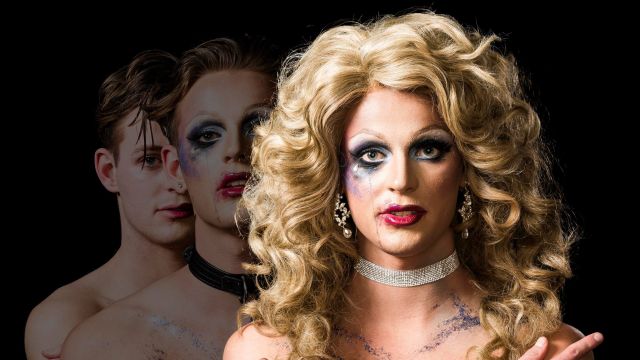Dragged
‘Stella’ (Samuel Thompson) is a drag artist – gorgeous, sexy but dissolute, unreliable and self-pitying. She’s taking a break and a half bottle of Scotch between sets at a drag show venue, and thinking back over her past. How did she get here? She remains on stage throughout, mostly in postures of abject defeat, as we go back into that past: so she’s a framing device and occasional Narrator.
The show’s title is a pun or has a double meaning, if you like: our central character, Boy (Louis Corbett) grows up to be ‘Stella’, but there‘s also the implication that he was ‘dragged’ by whatever forces – family, genes, fate, his teenage milieu - to this role or persona. In a series of scenes from the past we see all these forces at work.
Family? His confused, alcoholic mother (Anna-Mai Hoek) and his angry, violent and (of course) homophobic father (Aaron Halstead in a quite frightening performance) always at war although their marriage is long dead. There is Boy’s vehement denial that he’s gay – despite lots of sex with his ‘mate’ Simon (a touching, intense Dean Robinson), the true love he loses. And there’s his milieu: discos and dance parties, loud, drunken, desperate and directionless, where kids hook up temporarily, are betrayed or lost. It’s a tawdry world, designed by Michele McNamara, littered with the trash of fast food and alcohol. It is these milieu scenes, in which dialogue is lost under the sound design, that are the strongest, or most convincing, ‘influence’ on Boy’s unhappy (because in this story, it is unhappy) trajectory. There is an acting problem, however, in this trajectory: Mr Corbett’s Boy is a little soft and recessive and we see not the slightest sign in him of the flamboyant ‘Stella’. Shouldn’t we?
The supporting cast, whom Mr Aisbett calls ‘Chorus’, principally for their roles in the milieu scenes, also provide some very sharp, funny and entertaining cameos. Alex Cooper is a crazy guy, who’ll have sex with anyone, any time in the dance party scenes. He’s also ‘Daryl’, Boy’s mother’s lover and a candidate for the most boring man unhung at her AA group. Jaq Avery is the motherly Stage Manager at the drag show venue, and ‘Anne’, a member of the AA group (her suffering so dull that no one listens to her), and a hysterical screamer in the milieu scenes. Amanda Santuccioni is disturbing as another milieu desperate, and does a simply brilliant turn as ‘Pam’ at the AA meeting when she objects to Boy’s presence. But Mr Aisbett really pushes his luck when he has Ms Avery, in her rave party persona, deliver a monologue about love and what it means that is so daffy it would be rejected by Hallmark greeting cards. Hello? Is this comic relief?
It’s unfortunate then that these cameos and the energy and fun they bring to the proceedings have only a tenuous connection to the story of how Boy became ‘Stella’. The scenes of Boy’s denial of his sexuality, despite Mr Robinson’s performance, and those of the feuding parents are, I’m sorry to say, just that bit cliché. That is to say, predictable, and well-worn. Maybe there are not a lot of ways to do these obligatory scenes, but they could be written - not played - with greater insight. Ms Hoek and Mr Halstead do wonders with some very ordinary writing. As for Mr Thompson’s ‘Stella’, it is again the writing that lets things down: she is whiney, one-note and exhibits the most fatal of all character traits, that self-pity. What’s needed, surely, is some objectivity and insight to make the connections between past and present – and then perhaps some acceptance of herself? Every drag queen I’ve seen lately has been tough as old boots, but maybe I’ve been lucky.
It’s not clear if the two musicians on stage throughout are Shane Mitchell and Bradley Price, the people who are thanked in the program notes for ‘scoring the work so perfectly’ – the sound design is credited to Shane Blackshaw – but all three do a fine job.
Clearly, Michele McNamara, the director as well has the designer, adds vitality and some vivid imagery to the mix. The show flares into life intermittently (and the audience responds when it does), but it might be best to consider Dragged at this point as a ‘work in progress’ for playwright Aisbett. The subject matter per se is probably of some interest to the midsumma audience, but they too might well say, “Here we go again…’ The text can be better focussed and better handled so as, perhaps, to be of interest to everyone for its insights and depth.
Michael Brindley
Subscribe to our E-Newsletter, buy our latest print edition or find a Performing Arts book at Book Nook.

